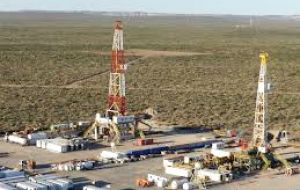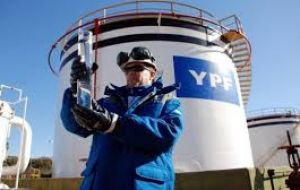MercoPress. South Atlantic News Agency
Can Argentina capitalize on its vast shale reserves?
 Experts have kept an eye since the US Energy Information Administration identified Argentina as holding the world's second largest shale gas and fourth largest shale oil reserves.
Experts have kept an eye since the US Energy Information Administration identified Argentina as holding the world's second largest shale gas and fourth largest shale oil reserves.  Argentina's shale fields are currently producing 41,000 barrels of oil equivalent per day from 320 wells. YPF expects both figures to increase in 2015.
Argentina's shale fields are currently producing 41,000 barrels of oil equivalent per day from 320 wells. YPF expects both figures to increase in 2015.  Currently Argentina's subsidized domestic market will shield producers in the short term. Oil prices are set at $77.50 per barrel and natural gas as $7.5 per MMBt
Currently Argentina's subsidized domestic market will shield producers in the short term. Oil prices are set at $77.50 per barrel and natural gas as $7.5 per MMBt Argentina, once a regional energy leader, is now better known for financial busts and bombastic politicians than hydrocarbons prospects. Still, with a resource potential both vast and untapped, the nation has never been far from energy investors' minds. The question today is just how much Argentina is willing to change and how this plays into a low oil price environment that is already negatively impacting investment elsewhere.
Argentina's deliberate efforts to appease some of its international creditors, combined with an overhaul of the nation's hydrocarbons framework have the potential to lure foreign investors back. The promise of a change of government– and potentially a more market-friendly approach – later this year should add to the country's appeal.
Experts have kept a watchful eye on Argentina ever since the US Energy Information Administration identified the nation as holding the world's second largest shale gas and fourth largest shale oil reserves. This translates to an estimated 802 trillion cubic feet of technically recoverable shale gas and 27 billion barrels of oil.
Yet unlike the production boom unleashed by the shale revolution in the United States, Argentina's vast shale plays have remained comparatively idle.
Politics and economics are largely to blame.
Investor confidence in Argentina has been damaged by heavy-handed nationalist politics, including the nationalization of oil company YPF in 2012. Price caps and export restrictions have added to what many view as a trying business environment.
Exploration and production in Argentina is also expensive. It costs an estimated $11 million per well in Argentina, a figure YPF hopes to bring more into line with international standards of $7 million by the end of the year. Whether this target is feasible remains to be seen.
But in the nation famous for the Albicelestes, things are starting to change. Argentina is making efforts to improve relations with international creditors and agreed to a $5 billion settlement with Spanish company Repsol as compensation for its YPF stake.
Meanwhile, exploration and production in the unconventional fields is slowly picking up. Argentina is one of just four countries to produce commercial quantities of shale oil or gas – joining the US, Canada, and China – and is the only producer in Latin America. Most of this production has come from the Vaca Muerta formation in west-central Argentina.
Argentina's shale fields are currently producing 41,000 barrels of oil equivalent per day from 320 wells. These are important milestones for the nation's oil and gas industry and YPF expects both figures to increase in 2015.
Foreign investors are also trickling back to Argentina. Chevron was the first oil major to take the plunge with a deal worth a potential $15 billion. YPF has also received commitments from DOW Chemical for a potential $188 million and Petronas for a potential $9 billion, both in Vaca Muerta. YPF has also signed preliminary deals with Wintershall and Sinopec.
The Argentine government hopes the overhaul of the national hydrocarbons law will further spur investor activity. Many of the benefits included in Chevron's deal have been carried over, including the ability to export up to 20% of production free of tariffs or sold domestically at international prices. The legislation also caps royalties for oil-producing provinces at 12% and centralizes the bidding process.
Replicating the United States' success was always going to be a tall order. The unique set of factors, including easy access to financial and human capital, technology, know-how and a favorable regulatory and business environment - are not easily reproduced in Argentina or elsewhere.
Argentina is instead seeking to adapt US technology and innovation to increase efficiency and productivity in existing and new wells, with a focus on large-scale drilling and cost reduction.
As for the low price environment, Argentina's subsidized domestic market will shield producers in the short term. Oil prices are set at $77.50 per barrel and natural gas as $7.5 per million British thermal units (MMBtu). Of course, this provides no such protection for exporters.
A new administration will need to address the issues of subsidies as well as boost local production in order to reduce the energy trade deficit that is costing Argentina's government an estimated $6 - 8 billion per year.
In the meantime, excitement around Argentina's energy prospects is welcome and while investors are wise to remain cautious, there are positive signs that the nation's energy ambitions are within reach.
By Alexis Arthur for Oilprice.com




Top Comments
Disclaimer & comment rules-

-

-

Read all commentsArgentina, once a regional energy leader, is now better known for financial busts and bombastic politicians than hydrocarbons prospects.
Apr 02nd, 2015 - 08:19 am 0The above says it all !!!!!!
With today's success in finding more oil and gas off the Falkland Islands, who needs Argentina?
Apr 02nd, 2015 - 08:22 am 0They're pinning a lot on a new president. But after 70 years what will really change?
Apr 02nd, 2015 - 10:07 am 0Commenting for this story is now closed.
If you have a Facebook account, become a fan and comment on our Facebook Page!